Volunteer stories
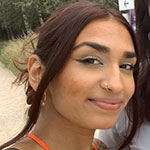 Dena Khan
Dena Khan
Young Research Champion, NIHR Young Person’s Steering Group (NIHR Clinical Research Network West Midlands)
When did you start volunteering?
I started in 2014, at the age of 14.
Why did you choose to volunteer?
My aunt is a research nurse, who recommended I tag along to one of the meetings. I knew very little about clinical research but had a general interest in healthcare. However, being introduced to a fiercely passionate community of research champions, PPIE (patient and public involvement and engagement) coordinators and researchers looking to make a meaningful difference meant I ended up sticking around until I was probably a bit too old to qualify as a young person!
Describe what did you do in 100 words
I joined in on monthly meetings, collaborating with clinical researchers to make sure the work being done upheld young people’s voice at the heart of it. PPIE covers all part of the research process; there were times where I would work with researchers to help flesh out potential research ideas, to helping design and improve patient information sheets for recruitment. I was able to co-author and edit clinical papers to improve accessibility, and even got to present at a few conferences here and there.
What did you enjoy most about your role?
Sincerely, everything. Being a part of this group equipped me with the skillset and the drive to want to make meaningful change. Coming across so many people from different disciplines, communities and perspectives massively boosted my confidence. It even helped me figure out a career path; I loved being a part of the research process so much that I am now undertaking a postgraduate degree in the Health Services and Population Research Department at King’s College, with the hopes of one day completing a PhD (with public engagement at every step!)
What advice would you give to someone who was thinking about volunteering in health and care?
Absolutely do it. Whilst it might be nerve-wracking throwing yourself into something unfamiliar, the experiences and skills you gain purely by surrounding yourself with the committed and resilient people that form the NHS is something you won’t find anywhere else.
How would you describe the NHS in one word?
Lion-hearted.
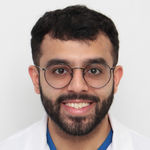 Rehman Ali Baig
Rehman Ali Baig
NIHR Young Research Champion, Birmingham Children’s Hospital.
When did you start volunteering?
I joined the Young Research Champions, working with the team at the NIHR Clinical Research Network West Midlands when I was 15.
Why did you choose to volunteer?
I had been a patient at Birmingham Children’s Hospital and I wanted to give back. I wanted to make research more appropriate for children. I also had an interest in medicine, and this was a great opportunity to find out more about how research happens.
Describe what did you do in 100 words
Research taking place in hospitals can be scary for children and young people. The research leaflets and brochures that doctors and nurses use were a bit scary, with bulky text and scary pictures. We worked as a group to tailor these leaflets to children.
My role also had a focus on making gaps in research more public and encouraging young people to get involved in research and to volunteer for research studies.
I stopped being a young research champion in my second year at university, but I have re-joined now as a group facilitator. I always wanted to be a doctor, a physician, and a researcher; this role gives me the opportunity to mentor the next generation of children and young people that want to be involved in research.
What did you enjoy most about your role?
As a young research champion in the NHS, I really enjoyed seeing projects from beginning to end. At our first group meeting, we were asked to share our views and give advice on a research study. We worked on the leaflet to recruit volunteers and then recruited young people to volunteer on this project. I loved seeing the materialisation of research.
I made friends for life too. In the group, we were all coming from different schools but shared an interest in science, research and helping people. We met once a month. We’re still in touch and meet up from time to time.
What advice would you give to someone who was thinking about volunteering in health and care?
Go for it. Do it. It can be challenging and tough and it may be hard for young volunteers to find time with conflicting exams. But if you want to make new friends and learn about research, being a young research champion is the best.
You’ll develop new skills like public speaking, leadership skills and team working. You’ll learn how to speak to people you’ve never met before, which for young people can be something entirely new.
I now work for the Department of Paediatric Neurosurgery, at Birmingham Children’s Hospital. I am a researcher and a physician, and very regularly present publicly the findings of my research in the UK and abroad. I use every day the skills I learned as a young research champion.
How would you describe the NHS in one word?
Underappreciated.
See below for more volunteer stories
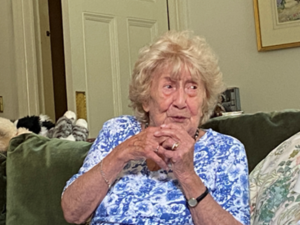 Patricia Daniels MBE
Patricia Daniels MBE
Volunteer at Chester Childbirth, Countess of Chester Hospital.
When did you start volunteering?
I retired in 1989 and began volunteering in earnest in 1991 for Chester Childbirth at the Countess of Chester Hospital.
Why did you choose to volunteer?
When training as a nurse, I used to make frilled hats for my fellow nurses and donated the funds to a local charity. Having spent my whole career in the NHS, and retiring as a senior midwife, I knew where things were missing and was determined to make things better.
Describe what you do in 100 words
It’s all been about making a difference to the lives of patients, their families, and the staff.
My major contribution has been setting up and ensuring the smooth running of the Comfort Zone. It is important to me that with all the intensity of life in the hospital that there is a space where people can find some space and recharge for whatever they are facing next.
What do you enjoy most about your role?
The focus is about the mums, babies, dads, children – everyone associated with the Women and Children’s Unit of the Countess of Chester Hospital. I care about them all. I particularly enjoy being involved with projects and meeting people at all levels.
What advice would you give to someone who was thinking about volunteering in health and care?
Choose something you are interested in, something that catches your imagination, and go for it.
How would you describe the NHS in one word?
Unique.
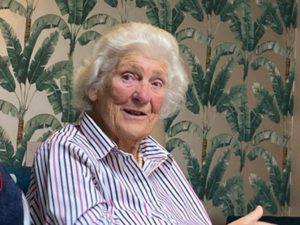 June Whittaker
June Whittaker
League of Friends executive member, Royal Shrewsbury Hospital.
When did you start volunteering?
1969.
Why did you choose to volunteer?
When I married, and my husband and I moved back to Shropshire and his family home, my mother-in-law suggested that the League of Friends of the Royal Shrewsbury Hospital was ‘the charity’ to get involved in.
Alongside this, I have volunteered with lots of other charities including the NSPCC and St John Ambulance.
Describe what you do in 100 words
I see it as part of my role to support the local community. The League of Friends particularly meets this, because it doesn’t send its money centrally, but spends it on things identified by the local community. Through the Friends the community had a channel to fund the changes it wants to see.
I sit on the Executive Committee, and the Fundraising Committee, so I go to meetings and support the charity governance. It’s also about attending and supporting as much as I can.
What do you enjoy most about your role?
I love meeting people, chatting with them, and being part of something that makes the community stronger. It’s important to me, that what I do makes a tangible difference to the lives of people around me.
What advice would you give to someone who was thinking about volunteering in health and care?
For me, there is a lot about being involved in charity. It’s about finding a charity that is local, and then people around you will support what you are doing.
How would you describe the NHS in one word?
Dedicated.
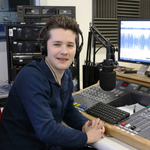 Dan Sambell
Dan Sambell
Radio presenter, Coventry Hospital Radio –West Midlands.
When did you start volunteering?
2013.
Why did you choose to volunteer?
The main reason was to get into the radio industry, as I’d always been passionate about radio since I was five. Hospital radio is an obvious way and has worked well for me, but it’s also really rewarding to meet patients and brighten up their stay. You are doing what you love but also getting a great reward – and it has helped me to go on and become a BBC presenter.
Describe what you do in 100 words
Essentially, it’s cheering patients up through the power of your voice and some really feel-good music. Once a week, I prepare, produce and present my own music radio show which goes out live on Coventry Hospital Radio directly to patients’ bedside entertainment system, completely free of charge so that patients always have something to keep them occupied. I play feel-good songs and take requests from patients too. Any songs that aren’t requested, I carefully pick out to ensure they’ll help put a smile on a patient’s face. I play a variety of genres and decades.
What do you enjoy most about your role?
Everything! Knowing that you are putting a smile on patients’ faces. The best thing is when you get chance to go round the wards and seeing their face light up when they hear a song they love or have requested. Not everybody has a relative coming to see them so it means the world to them.
How would you describe the NHS in one word?
Resilient.
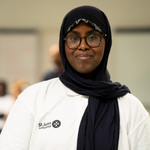 Sumia Mohamed
Sumia Mohamed
NHS Cadet – North Bristol.
When did you start volunteering?
March 2022.
Why did you choose to volunteer?
I joined the St John NHS Cadets programme to help understand and gain an insight into the NHS. I wanted to strengthen and build on the skills I have too.
Also, I knew I wanted to work in the NHS but wasn’t sure what role to pursue. Being an NHS cadet with St John has helped me narrow down what I wanted to do. I’m now applying to become a paramedic at university with the skills I have learnt.
Describe what you do as an NHS Cadet in 100 words.
We talk about what the NHS actually is as well as the different career paths it offers. I have had the opportunity to learn first aid training and what to do in an emergency. We also have the chance to build and strengthen our personal skills.
What do you enjoy most about NHS Cadets?
I enjoyed being able to have discussions and learn new things about the NHS as well as make new friends. Being able to build on my communication skills in front of a group really helped build my confidence.
What advice would you give to someone who was thinking about volunteering or working in health and care?
Don’t be scared to ask questions. Volunteering at the hospital in Bristol really scared me at first but the NHS and St John volunteering team are so helpful when you have any concerns.
How would you describe the NHS in one word?
Hardworking.
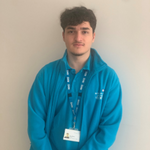 Ali Macit
Ali Macit
Patient Experience Volunteer, North West Anglia NHS Foundation Trust.
When did you start volunteering?
February 2022
Why did you choose to volunteer?
The National Health Service was founded in 1948 and with many years of progression it has grown and advanced juristically through the hard work of doctors, nurses and other allied healthcare professionals to be the service it is today. Being part of such a community of dedicated individuals who centre the care and wellbeing of others is an incredible environment to volunteer in and be a part of, hence why I chose to be a volunteer.
Describe what you do in 100 words
As a patient experience volunteer working as a mealtime companion, I assist in maintaining nutrition and hydration in patients, tea and coffee rounds as well as aiding with mealtimes, encouraging patients to eat and drink independently. Observing the difference that my role makes to patients and ward staff is truly rewarding.
What do you enjoy most about your role?
To pinpoint a singular moment that has been memorable to me is impossible as every day is distinctive and unique in its own way. Having such responsibility to help in the care for others and the gratitude that is reciprocated between staff and patients is amazing, something truly worth being involved in.
As an aspiring medic, such a volunteering programme has aided my application in many ways. This role has highly boosted my communication and interpersonal skills and developed my skillset in patient care whilst giving me that familiarity with medicine and the ward structure.
What advice would you give to someone who was thinking about volunteering in health and care?
The exposure gained from such a patient facing role is incredible, meeting new patients daily who all have their own story about their journeys and having patients compliment the work you do makes it very rewarding and motivational.
How would you describe the NHS in one word?
Describing the NHS in one word is tough. They are everything and go above and beyond for the care of patients, however the word I would use would be “wonderful”.
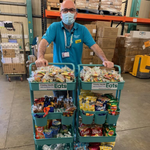 Andy Booth
Andy Booth
Emergency Department Patient Companion, Emergency Assessment Centre, Wexham Park Hospital – Buckinghamshire.
When did you start volunteering?
September 2019.
Why did you choose to volunteer?
In 2019 there was a note on our village Facebook page about volunteering in the new Emergency Assessment Centre. Until then, I had not thought of volunteering in a hospital. However, I come from a medical family, my father was an obstetrician and gynaecologist in South Essex, and both my brothers work within the NHS in Essex as a GP and an advanced paramedic.
The Facebook page triggered an interest and having visited the hospital, I realised that I could also, partly, follow the family and help patients while they are, unexpectedly, in a strange environment. My role is to listen and talk with them, and to make tea or coffee.
What do you enjoy most about your role?
Seeing the patients smile.
What advice would you give to someone who was thinking about volunteering in health and care?
Go into volunteering to enjoy your volunteering time. It’s not always like the TV shows. Listen to the staff as they will give you good advice.
How would you describe the NHS in one word?
Magical.
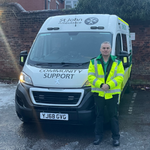 Adam Brogden
Adam Brogden
Emergency Ambulance Crew (EAC) with St John Ambulance, North West – Preston and Stockport.
When did you start volunteering?
I joined St John Ambulance as a first aid volunteer around nine years ago but decided to train as a volunteer ambulance crew three years ago.
Why did you choose to volunteer?
I volunteer because I want to support my local community and be able to help people when they need it most. I am proud to be a member of St John Ambulance and everything we stand for.
Describe what you do in 100 words
As Emergency Ambulance Crew, I work on shifts on a range of vehicles to support the North West Ambulance Service (NWAS). I also help out at local events and on various community support activities. On NWAS shifts, we are treated as crew – we sign-on as crew, and are deployed to a wide range of incidents, including the sickest patients and seriously injured – often whilst working with paid staff and other agencies. This makes me feel immensely proud of my role, and always grateful for their support.
What do you enjoy most about your role?
St John Ambulance is now a big part of my life. It has allowed me to develop new skills. I have made new friends, and experienced some of the most difficult, challenging, and rewarding experiences of my life. I take the role seriously and work hard to be the best I can be. Being an Emergency Ambulance Crew is not an easy role, but the personal rewards are enormous.
What advice would you give to someone who was thinking about volunteering in health and care?
Choose carefully but do it! Volunteering can have a positive impact on your life and the lives of the people you support. Volunteering will give you opportunities you might never otherwise experience.
How would you describe the NHS in one word?
Compassion.
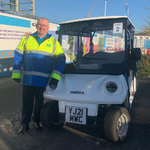 Martin Bryan
Martin Bryan
Shuttle buggy driver, Royal Bournemouth Hospital, part of University Hospitals Dorset – Bournemouth.
When did you start volunteering?
October 2021.
Why did you choose to volunteer?
The volunteers were really helpful to my wife when she was poorly in hospital. I saw first-hand their value and wanted to give something back and offer my support.
Describe what you do in 100 words
We have four stops around the hospital, near main entrances, and I drive our patients and families to where they need to be. Due to major works being done on the hospital, accessibility is much more difficult than normal, and it can be quite confusing for visitors. I pick them up from where they are and take them to where they need to go. Some of them can be quite immobile so this service is a great help to them, keeping them comfortable on their visit. If I can reduce their stress in any way, I am always happy to help.
What do you enjoy most about your role?
I enjoy meeting the patients, visitors and staff. Every day is different. It is great to get to know people and build a relationship with them.
What advice would you give to someone who was thinking about volunteering in health and care?
Do it. You will get a great feeling of satisfaction out of it, and I enjoy every minute of my time at the hospital.
How would you describe the NHS in one word?
Fantastic.
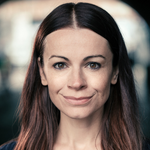 Sarah Leigh
Sarah Leigh
Butterfly volunteer, Lister Hospital, East and North Hertfordshire NHS Trust – Stevenage.
When did you start volunteering?
2021.
Why did you choose to volunteer?
I wanted to give back to the NHS. My son has a learning disability, and we frequently use services at the hospital. I’m also an advocate for accessible and equitable healthcare and thought I could bring this to the role.
Describe what you do in 100 words
As Butterfly volunteers, we sit with patients who are at the end of their life so they’re not alone. We are advocates for the patient and support families at a difficult time. We can provide respite for family members and peace of mind that their relative won’t be alone. We can also assist with overnight needs if a family member wants to stay with their loved one – eg a bed, toiletries, and, of course, cups of tea.
What do you enjoy most about your role?
I enjoy supporting relatives and creating a calm environment for those who are at the end of their life.
What advice would you give to someone who was thinking about volunteering in health and care?
Do it! It is so rewarding and you’re in good company with some of the most patient and kind people I have ever met.
How would you describe the NHS in one word?
Important.
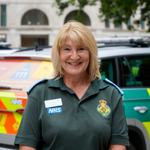 Jenny West
Jenny West
Emergency Responder, London Ambulance Service – London.
When did you start volunteering?
November 2019.
Why did you choose to volunteer?
I enjoy helping people. I manage GP practices for my ‘day job’ so volunteering has given me a chance to do ‘acute’ (life threatening) work. I also wanted to assist the London Ambulance Service in helping patients.
Describe what you do in 100 words
Emergency responders are trained to respond to 999 calls, usually Category 1 calls – these are life-threatening injuries or emergencies which can include cardiac arrests, traumatic bleeding or seizures. We’re in uniform and respond in marked ambulance cars with blue lights. We’re often first on scene because we don’t take patients to hospital so we’re available to respond quickly. We start life-saving treatment when we reach a patient, including CPR, using a defibrillator, oxygen therapy and controlling severe bleeding. If crews are already treating a patient, we are a useful extra pair of hands.
During the pandemic, we had further training so we could respond on ambulances.
What do you enjoy most about your role?
I love being able to make a difference – not just for the patient but also for their family. Because we are often first on scene, we really can make the difference between life and death. We see people at their most vulnerable and I feel very privileged to be able to help and support them and be part of the ambulance service. It’s very satisfying. Being a volunteer is also something that you can fit around your main job and your family commitments; I love the flexibility.
What advice would you give to someone who was thinking about volunteering in health and care?
My advice would be to definitely find out more and take that first step because working for London Ambulance Service is so interesting and rewarding.
How would you describe the NHS in one word?
Caring.
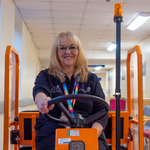 Karen Weites
Karen Weites
Volunteer, North Tyneside General Hospital – Newcastle upon Tyne.
When did you start volunteering?
August 2019.
Why did you choose to volunteer?
I visited North Tyneside General Hospital with a family member. We had to be taken to the ward in the shuttle buggy. I decided I’d like to do this so picked up an application form. I couldn’t do it straight away as I had a hip operation. After it healed, Covid hit. However, I was determined to volunteer and help. Also, my sister started work for the NHS on the very first day it opened – she worked at the executive council.
Describe what you do in 100 words
Over the last few years, I have done all sorts of different things, such as working in the hospital café (Harry’s), meeting and greeting patients and relatives at the main entrance and buggy driving. I have also helped with other seasonal roles such as vaccination clinics in the community and knitting fiddle mitts and blankets for the wards.
It can be quite daunting for some people to come to hospital, so I meet everyone with a smile and guide them to where they need to go. I also answer any questions they may have. I try and make them feel at ease.
What do you enjoy most about your role?
I love meeting and helping people, and driving the buggies, especially taking the children to outpatients. I also like helping the service and giving something back. I thoroughly enjoy my volunteer roles as I feel part of a team and feel like I’m doing something essential.
What advice would you give to someone who was thinking about volunteering in health and care?
It’s such a super thing to do and it makes you feel valued doing something so worthwhile. I tell people that they should sign up and they can do shifts to suit them. It’s really good for your own wellbeing too. I live on my own and it gets me out of the house meeting people.
How would you describe the NHS in one word?
I can’t do just one. Fantastic, amazing, unique.
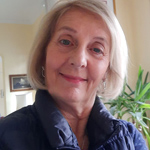 Cynthia Burton
Cynthia Burton
volunteer with the Friends of the Royal London Hospital for Integrated Medicine, London.
When did you start volunteering?
1993.
Why did you choose to volunteer?
I was asked by a friend of mine who was in her 70’s at the time. She and I both had a passion for complementary medicine. So really, that’s how it started and the hospital that I belong to is the Royal London Hospital for Integrated Medicine, formerly known as the Royal London Homeopathic Hospital.
Describe what you do in 100 words
Firstly, you meet and interact with the other trustees on the committee and help them make decisions on how to spend funds to help people in the hospital. Secondly, you also meet the people in the hospital, you meet the managers, staff, and they also become Friends as well. And we supported the people in the hospital by way of giving grants for items to make the people in the hospital’s lives a bit easier. It might have been items that they couldn’t afford as well as supporting educational training and research. Thirdly, and probably most importantly, you’re helping patients who visit the hospital. At our hospital we had a snack bar, and we became known at the snack bar for our ‘Tea and Sympathy.’
What do you enjoy most about your role?
It becomes a two-way thing; you’re interacting with not only the people who are patients but the hospital staff. So, you’re kind of a family really and the more you give I think the more you get out of it.
What advice would you give to someone who was thinking about volunteering in health and care?
When volunteering, you can give a little but get back a lot. So even if you’ve only got a little bit of time to give, it is rewarding in whatever role that you do. You don’t have to give 100% of your time. You can give half a day a week, but it’s still valuable time for the organisation that you’re working for. So always consider becoming a volunteer in an area which interests you because then you are rewarded on both sides. You see the benefit that you’re giving to people as well as what you’re getting out of it. It’s definitely a two-way thing.
How would you describe the NHS in one word?
Life-changing.
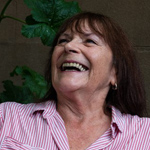 Jan O’Neill
Jan O’Neill
volunteer Macmillan Cancer Centre and the Guild of the Royal Hospital of St. Bartholomew – London.
When did you start volunteering?
2009.
Why did you choose to volunteer?
When I retired, I had loved my job and I was absolutely bored to sods. I also felt like a non-person because you meet people and they say, “what do you do?”, first question, and I’d just mumble “retired” and then try to change the conversation, so I really wanted to do something useful again.
Describe what you do in 100 words
So, I have two roles. One is a volunteer in the Macmillan Cancer Centre at St. Bartholomew’s, and it’s supporting the needs of staff and listening to patients and their relatives and sometimes directing them to services. But most of my time is really working at the Guild of the Royal Hospital of St. Bartholomew, usually known as Bart’s Guild, and our aim is to benefit patients and staff at the hospital. We do that through personal care like the trolley service on the wards, we run a hospital shop where you can buy just about anything, and volunteers always have time to talk to people who are upset. We give financial help for things like refurbishing rooms, providing equipment for the wards and grants, we also maintain a beautiful little garden within the hospital’s grounds — the Princess Alice Garden — and it’s an absolute haven right in the middle of the city where patients and relatives can sit, and staff quite often go there to eat their lunch. We also take part in all kinds of hospital events. Probably the most important thing I do is that I edit and write for a twice-yearly magazine that the charity has, called Bart’s Guild News, and I also produce the Christmas concert which we hold in Bart’s wonderful Great Hall.
What do you enjoy most about your role?
I think it’s an incredible privilege when patients and their relatives confide in you and I’m humbled by their courage and their fortitude, they’re amazing people. It’s nice to feel that you’ve helped even in a tiny way. Also, I’m just permanently blown away by the skill and the kindness of the staff at the hospital, everything from Macmillan nurses through to the ladies and gents who clean the wards, the porters, the surgeons, everybody. It’s amazing to be part of that team even as a tiny little screw in one of the cogs. It’s very satisfying, it’s also fun. In my case it was also really nice to be able to use my professional skills from press work and the theatre earlier on and find a new use for them.
What advice would you give to someone who was thinking about volunteering in health and care?
That’s easy, do it, do it, do it! You’re going to be part of an incredible team and you’re going to meet lots of nice people and make new friends. Whatever your skills or talents are, there’ll be something that you can do.
How would you describe the NHS in one word?
Invaluable.
